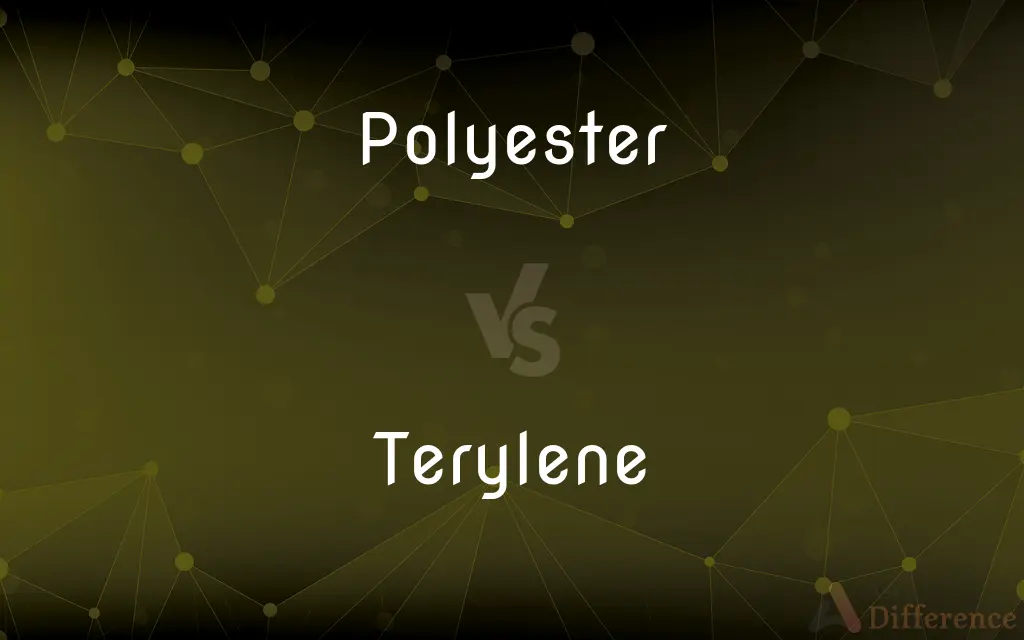Polyester vs. Terylene — What's the Difference?
By Tayyaba Rehman & Fiza Rafique — Updated on September 11, 2023
Polyester is a general term for any synthetic fabric or material made from polymer-based fibers. Terylene is a specific brand of polyester fiber invented in Britain.

Difference Between Polyester and Terylene
Table of Contents
ADVERTISEMENT
Key Differences
Polyester is a broad category of synthetic fibers that are utilized in various applications, ranging from textiles and plastics to industrial uses. Terylene, on the other hand, refers to a specific type of polyester that was first produced in the United Kingdom and is often used in textile manufacturing.
Both Polyester and Terylene are made from long-chain synthetic polymers, which essentially means that they are plastics. However, while Polyester serves as an umbrella term for these types of materials, Terylene is a branded version that has its own distinct properties and uses.
In terms of applications, Polyester can be found in a variety of products like clothing, bottles, and even boat sails. Terylene is usually more specific in its application, primarily used in textiles such as fabrics for clothes and furnishings.
While Polyester is widely recognized and used globally, Terylene, as a brand, may not be as universally known. Both materials are praised for their durability, but Terylene might be more associated with a particular quality or manufacturing standard due to its branding.
Comparison Chart
Category
General term
Specific brand
ADVERTISEMENT
Origin
Generic
Originated in the UK
Applications
Wide range
Primarily textiles
Recognition
Globally recognized
More localized recognition
Material Composition
Long-chain synthetic polymers
Specific type of polyester
Compare with Definitions
Polyester
A synthetic fiber made from polymers.
The dress is made of 100% polyester.
Terylene
Primarily used in textiles.
The curtains are made from Terylene.
Polyester
Used in various industries.
Polyester is used in both textiles and plastics.
Terylene
Originated in the United Kingdom.
Terylene was first produced in Britain.
Polyester
Known for durability.
The polyester fabric is very durable and lasts long.
Terylene
A branded type of polyester.
Terylene is a popular material for suits in the UK.
Polyester
Globally recognized.
Polyester products are available worldwide.
Terylene
Known for specific quality standards.
Terylene is often used for its high quality.
Polyester
Resistant to moisture.
Polyester is a good choice for outdoor furniture.
Terylene
Limited to specific applications.
You won't find Terylene in plastic bottles.
Polyester
Polyester is a category of polymers that contain the ester functional group in every repeat unit of their main chain. As a specific material, it most commonly refers to a type called polyethylene terephthalate (PET).
Terylene
An artificial textile fibre made from a polyester, used to make light, crease-resistant clothing, bed linen, and sails.
Polyester
A synthetic resin in which the polymer units are linked by ester groups, used chiefly to make synthetic textile fibres.
Terylene
A polymer, polyethylene terephthalate (PET), used for making thread and cloth.
Polyester
Any of numerous synthetic polymers produced chiefly by reaction of dicarboxylic acids with dihydric alcohols and used primarily as light, strong, weather-resistant resins in boat hulls, textile fibers, adhesives, and molded parts.
Terylene
A kind of polyester fabric
Polyester
A wrinkle-resistant fabric of fibers made from any of these resins.
Polyester
Any polymer whose monomers are linked together by ester bonds
Polyester
A material or fabric made from polyester polymer
Polyester
Of, or consisting of polyesters
Polyester
Any of numerous synthetic resins; they are light and strong and weather resistant
Polyester
A complex ester used for making fibers or resins or plastics or as a plasticizer
Polyester
Any of a large class of synthetic fabrics
Common Curiosities
Is Terylene a type of Polyester?
Yes, Terylene is a specific type of polyester.
Can I use the terms Polyester and Terylene interchangeably?
No, Terylene is a specific brand, while polyester is a broader term.
What is Terylene?
Terylene is a specific brand of polyester, primarily used in textiles.
Is Polyester durable?
Yes, polyester is known for its durability.
Where was Terylene originated?
Terylene originated in the United Kingdom.
What are common uses of Terylene?
Terylene is primarily used in textiles.
Is Polyester moisture-resistant?
Yes, polyester resists moisture well.
Where is Terylene commonly used?
Terylene is more localized, with a strong presence in the UK.
What is Polyester?
Polyester is a general term for synthetic fibers made from polymers.
Is Terylene durable?
Yes, like polyester, Terylene is also durable.
What are common uses of Polyester?
Polyester is used in clothing, plastics, and industrial materials.
Is Terylene moisture-resistant?
Terylene shares the moisture-resistant properties of polyester.
Is Terylene more expensive than Polyester?
Terylene could be more expensive due to its specific quality standards.
Do both Polyester and Terylene require special care?
Both are relatively easy to care for, but always check care instructions.
Where is Polyester commonly used?
Polyester is globally recognized and used.
Share Your Discovery

Previous Comparison
Option vs. Optionality
Next Comparison
Whortleberry vs. BlueberryAuthor Spotlight
Written by
Tayyaba RehmanTayyaba Rehman is a distinguished writer, currently serving as a primary contributor to askdifference.com. As a researcher in semantics and etymology, Tayyaba's passion for the complexity of languages and their distinctions has found a perfect home on the platform. Tayyaba delves into the intricacies of language, distinguishing between commonly confused words and phrases, thereby providing clarity for readers worldwide.
Co-written by
Fiza RafiqueFiza Rafique is a skilled content writer at AskDifference.com, where she meticulously refines and enhances written pieces. Drawing from her vast editorial expertise, Fiza ensures clarity, accuracy, and precision in every article. Passionate about language, she continually seeks to elevate the quality of content for readers worldwide.













































